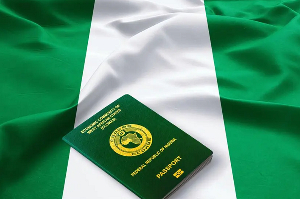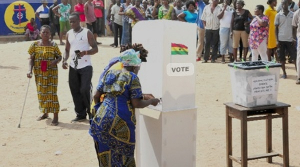- Home - Entertainment
- Lifestyle News
- Entertainment Videos | TV
- Year In Review
- Music News
- Entertainers
- Entertainment Archive
- Entertainment Photos
- Jokes
- Entertainment Headlines
- Ameyaw Debrah
- Brown GH
- Celebrities Buzz
- GH Base
- Ghana Celebrities
- Gh Gossip
- GH Page
- GH Splash
- Hot Gossip GH
- YEN

Entertainment of Thursday, 2 October 2003
Source: JANICE RHOSHALLE LITTLEJOHN
Trading Places, Like America for Ghana
LOS ANGELES - The Russell family likes comfort: their three-bedroom, three-bathroom suburban home in Birmingham, Ala.; a packed refrigerator with an automatic ice machine; central air conditioning, and, when mom doesn't feel like cooking, fast food restaurants. So why would they trade all these middle-class amenities for a sweltering mud hut in Lungu, Ghana, with no electricity, no plumbing, and no golden arches for thousands of miles?
"It just sounded like it would be a blast," said Lynne Russell, who with husband Scott and their two children signed up for one of the cross-cultural adventures on the National Geographic Channel's "Worlds Apart."
The 13-episode series premieres 8 p.m. EDT Monday. Each week, one American family spends 10 days with a local household in a remote Third World village, participating in their customs, rituals and livelihoods. "We thought, wouldn't it be amusing if we took a whole family and all of a sudden their neighborhood was totally different," said Glenda Hersh, the series' co-executive producer. Added partner Steven Weinstock: "You take away some of the basic things we're familiar with, and project them into an environment that is culturally distinct and interesting, you're going to put them through both a psychological and emotional journey that's going to give them an appreciation of what really matters and what's important."
Lynne Russell said she jumped at the chance for what seemed the vacation of a lifetime, but acknowledged "I had no idea of what we would be going into. Even what I imagined was not exactly what we encountered." The Russells' journey to northwestern Ghana is featured in the series' premiere episode. For the first few days, the Russells had to adjust to the culture shock of living in a primitive village with extreme poverty, unappetizing food, rudimentary toilet facilities, horrendous smells and harsh terrain.
"The pen for the livestock _ the cows, the goats, the chickens, and all of that _ was about 15 feet from our room," recalled Scott Russell, a financial planner. "Where they cooked was no more than three or four feet from the livestock. It all hit me, it was really kind of a shock." "Essentially these families are cultural explorers," said Andrew Wilk, executive vice president of programming and production of the Washington D.C.-based National Geographic Channel.
"On the face of it, it might seem like, `Oh, what a great romantic cultural idea for me and my family,' but in essence, this is real cultural diversity," he continued.
"Watching these various individuals going through their own personal catharsis ... it's pretty amazing television."
One reality that didn't sit well for the feminist-minded American women in the series was the gender bias inherent in many Third World cultures: The women do the bulk of the work _ the cooking, cleaning and child rearing _ while the men have the luxuries of free time. "There was definitely a division," said insurance agent Deborah Johnson-Noble. She, husband Daryle and their two children recently returned to their middle-class digs in St. Louis from an excursion in Mongolia.
"I had never physically worked that hard in my life," said Deborah. "I worked eight and nine hours, and I was still supposed to cook dinner for my family and he's just sitting there because he can't help." Daryle Noble giggled. "Actually I enjoyed that," said the veteran policeman.
"We should have that custom here." As blacks in an Asiatic territory, the Nobles said racial differences were, surprisingly, a non-issue. "I don't think they looked at us as being African-Americans. I just think they looked at us as being Americans," Deborah said. In most episodes, the racial differences between the visiting and host families are obvious, but more apparent are the universal bonds that the two families share. That was one of the lessons learned by the Palmer family of East Brunswick, N.J., during their stay with the Orguba family of Kenya.
Chris, an engineer, wife Susan, a music teacher, and their three children were featured in the pilot episode, which aired in April and will be repeated Nov. 10. Over the past 10 months, the Palmers and Orgubas have stayed in touch, and there's now talk among the "Worlds Apart" producers of bringing the African family to the United States. "I want them to live here," said the Palmers' 15-year-old daughter, Allie.
"They're so great, and I want to get to know them more." Susan Palmer agreed: "It's really important for people to do things like this, to take a step outside of their lives. It's expanded my horizons and made me see the world in a different way, and I hope people watch it with that openness."
On the Net: www.nationalgeographic.com/channel/










